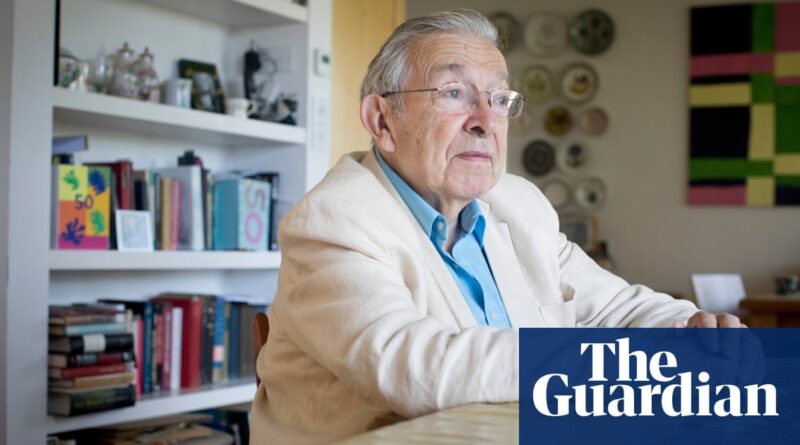Sir David Goldberg obituary
When psychiatrist David Goldberg, who has died aged 90 after suffering from Alzheimer’s dementia, discovered his knowledge in 1997, Queen Elizabeth II asked why when he gave it to him. He replied that it was because he taught a generation of doctors how to talk to people.
His psychiatry training (1962-69) took place at Maudsley Hospital, south-east London, working with the Institute of Psychiatry, now IoPPN, Institute of Psychiatry, Psychology & Neuroscience. David was drawn there as a trainee doctor after coming across a paper, Between Guesswork and Certainty in Psychiatry, by Aubrey Lewis, one of the center’s leading lights.
When he first started, David was happy to strip patients of their straijackets so they could drink tea – as long as they promised not to hit him. His approach coincided with the reform of the 1959 Mental Health Act, beginning the transition from residential to community care.
In the institute’s general education department, directed by Michael Shepherd, David became a senior lecturer in 1969 and developed the standard Clinical Interview List (1970) and General Health Questions (1972 ).
The GHQ continued to be used worldwide to assess stress and mental illness, and helped shape policy in low- and middle-income countries, with their diverse cultural and economic contexts. , often using non-clinical settings for interviews.
Appointed as a professor at the University of Manchester in 1972, David went to the US as a visiting professor in 1978-79, and found primary care and psychiatric problems in the homeless in Charleston, South Carolina. and Philadelphia.
This led him to develop interviewing techniques which he introduced to Manchester educators, and with Peter Huxley he arrived at what is now called the “filter model” of psychiatric services. Rather than simply dividing people into those who receive mental health treatment and those who do not, it describes the steps people go through when seeking mental health care.
David took note of the growing public awareness and acceptance of mental health conditions, and the pressure that general practitioners are constantly under. It is clear that many patients with mental health problems are seen in primary care, but only a small proportion make up hospitals where most of the resources are allocated, so he wanted to help patients walk the streets. concerned. He continued to focus on training not only primary care physicians but also psychiatry students, and developed a method to diagnose psychiatry in primary care.
Returning to the Maudsley and the institute in 1993, he introduced training using video, produced a series of Maudsley Discussion Papers, revived the important Maudsley Monographs and created public lectures.
Until his retirement in 1999 he advised the Department of Health on the development of psychiatric services and the World Health Organization as a mental health consultant. He spoke about the future of mental health research and psychiatry as chairman of the Psychiatry Research Trust (1999-2016).
Born in London, David was the son of Ruby (nee Brandes), a secretary, and Paul Goldberg, a civil servant. Their parents were Jewish immigrants from Germany in the 19th century. Growing up in the shadow of the second world war, the unsuspecting David realized that several events at the time might push him into mental health – though he wasn’t sure what it was.
In an interview with me in 2019 for the book Psychiatrists on Psychiatry, published last year, he recalled that if Hitler had attacked Britain, his father had planned to kill his entire family, and For several years he kept a bottle of barbiturates on his desk for the purpose. David continued to keep the bottle as a reminder on his desk.
The family moved to Oxfordshire for a while in the early war years, but the children, especially David, had a hard time and were abused for being outside London. This may contribute to his interest in understanding behavior and its consequences. He said that at that age he could not understand why people he had never met before – whether from Germany or Oxfordshire – should wish him harm’ lines.
From the William Ellis school in north London, in 1952 he went to Hertford College, Oxford. For the first two terms he studied botany, and in order to switch to medicine he had to take the Latin exams again. He had a great time at university, made friends, and appreciated the team spirit he experienced during his medical training at St Thomas’ Hospital in London (1957-59).
As throughout his career, David stressed the importance of people feeling respected and comfortable: “Sometimes I worked over 100 hours a week but we were treated very well. There was someone serving dinner and you felt important. These days, junior doctors are treated very poorly and don’t have the residency benefits that I had. It seems no one criticizes where he sleeps and eats.”
In 1966 he married Ilfra Pink. Their first meeting came while they were training and he was presenting a case to the ward. They had four children, Paul, Charlotte, Kate and Emma.
Ilfra died in 2017, and in recent years has enjoyed the company of Anne Geller, a doctor who was his girlfriend at Oxford in the 1950s. She provided him with immeasurable support as Alzheimer’s progressed.
I visited David every week for the past few years to meet him for a glass of constitutional champagne and to enjoy his infectious sense of humor, which lasted until the end.
He is survived by his children and nine grandchildren.
#Sir #David #Goldberg #obituary
